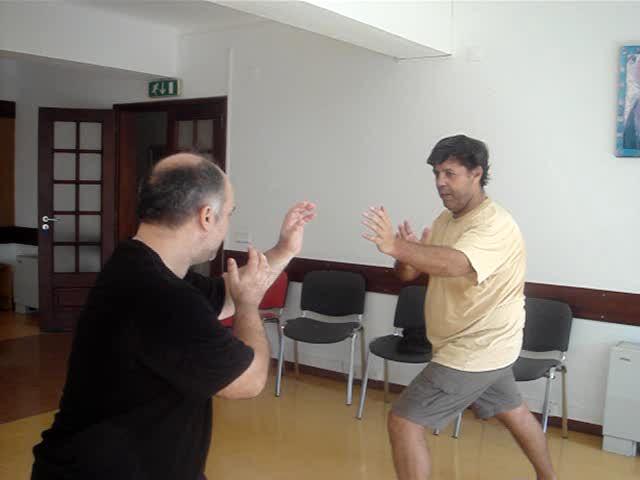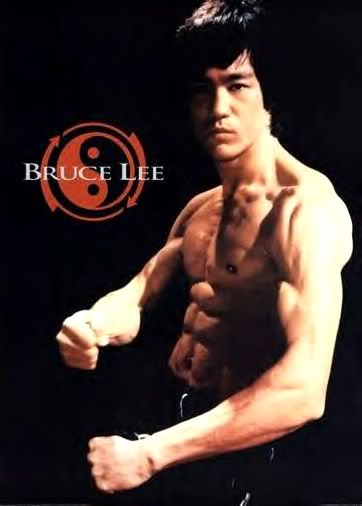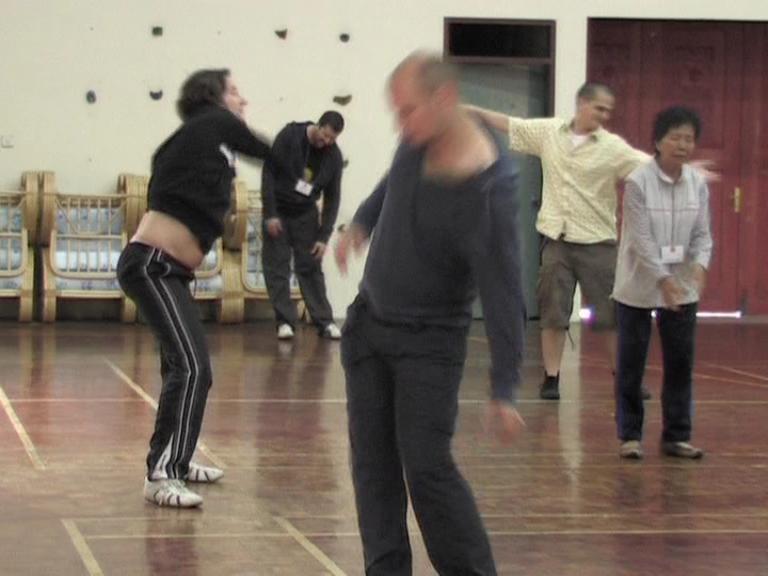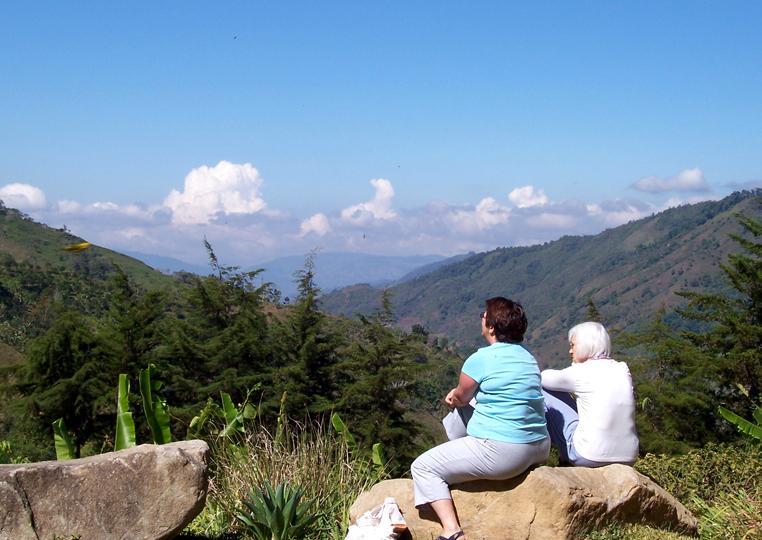SELECTION OF QUESTIONS AND ANSWERS
MARCH 2011 PART 3

Although we place much importance on combat effciency in our kungfu training, we value it much more for the benefits it gives that enable us to lead meaningful, rewarding lives
Question 1
I know many people apply for the Intensive Shaolin Kungfu Course and it is a very auspicious program. But my intentions are different. I do not have any formal training in kung fu, but as a young child I grew up as a stubborn and very aggressive and loud individual. However with very strong family support and a strong faith in the Islamic religion I have been longing to become a man of compassion and wisdom.
— Ismail, Canada
Answer
You may be happy to know that many people who attend my Intensive Shaolin Kungfu Course have similar aspirations as yours. Their main purpose is not to become formidable fighters, but to lead a rewarding, meaningful life bringing benefits to themselves and other people irrespective of race, culture and religion.
The hallmarks of the Shaolin arts are compassion and wisdom. We are happy to say that we have done well in this aspect, as is evident in the many testimonials we have received and the nature of discussion we have in our Discussion Forum.
My Intensive Shaolin Kungfu Course is more a course for personal development than for physical fighting. The course will push participants to their physical, emotional, mental and spiritual limits, so that they will emerge from the course a better person in all their physical, emotional, mental and spiritual dimensions.
There are some examples from past courses of how participants were pushed to surpass their physical, emotional, mental and spiritual limits. Complimentary tours were organized, but the training was so demanding that many of them chose to stay back to rest than to go to the tours.
Yet, by the third day, they could spar vigorously for two or three hours without being tired or panting for breaths. Some people cried at the course, and they reported that the emotional cleansing cleared out negative emotions that had been repressed in them for years.
The mental demand was so great that some participants, including top doctors and company directors, could not tell their left hand from their right! Then they had a mental break-through. Their mind became so fresh and clear that they perceived things they could never before.
To many, the best part of the course was experiencing spiritual joy. They felt the presence of God, or whatever name they called the Supreme, and suddenly realized the truth of the spiritual teachings that they merely read or heard before.
However, the Intensive Shaolin Kungfu Course, is meant only for those who have some prior kungfu or other martial art experience. If you lack such experience, it is difficult for you to follow the course. You can take my Intensive Chi Kung Course instead. It is less demanding than the Intensive Shaolin Kungfu Course, and is open to fresh beginners.
Question 2
My main goal is to develop a chi gong state of mind to the fullest potential that my body, my mind, and my soul will thrive at. Now that I have finished those secular aspirations that I may have had, I want to dedicate years of my life to personal development.
Answer
My Intensive Chi Kung Course will meet your needs very well. It will give you good health, vitality and longevity to enjoy your work and play for a very long time.
It will give you a lot of energy and mental clarity so that you will do better in whatever you do. When you are ready, the invaluable skills you have learnt in the course, like attaining a one-pointed mind and merging with the Cosmos, will enable you to reach for the highest aspirations according to your chosen religion.

While we have much respect for Bruce Lee, we disagree with his philosophy, way of life as well as his physique. The above picture is reproduced from http://i476.photobucket.com/albums/rr127/ALtheNOBLE/bruce-lee.jpg .
Question 3
I have attached my resume to show the type of intellect I have and also the type of acknowledgment I have received for the level of physical health. I play many sports, I love to swim and I play basketball on a serious level.
I sometimes look at the physique of Bruce Lee and although his physique was very unique I see that in reality my family inheritance has given me a physique very similar to his. I have a very fast metabolism as well.
I am not too tall and not too thick. I am almost exactly elastic in comparison to Bruce Lee. I would now like to dedicate my time and efforts and my strong will to attaining true compassion and wisdom to be able to live for a true zest of life.
Answer
You may be surprised that while we have much respect for Bruce Lee, he is not a role model we aim at.
In fact, we disagree with his philosophy, way of life as well as his physique.
There is no doubt that Bruce Lee was fit and fast, and a terrific fighter, but he was not healthy and did not enjoy longevity.
He examplified what in Chinese medical terms is regarded as "external strength, internal weakness". He looked good outside, but was weak inside. While many people may admire his physique, it is not what we in Shaolin Wahnam train for. In fact we do not want a big, muscular body because big muscles lock up energy that could otherwise be used for life processes, and moreover the big muscles cause internal organs to overwork to compensate for the extra mass.
We also disagree with Bruce Lee's philosophy of kungfu and of life. Bruce Lee wanted to show the world how great Chinese kungfu was, and also how great a fighter he himself was. He succeeded excellently in both these aspirations. Many people in the world today know of kungfu because of Bruce Lee, and many people consider him the greatest fighter the world has produced.
Our aspirations are totally different. We do not aim to show the world how great kungfu is; we don't have to. We know from our own experience that the kungfu we practice is great, because it brings us wonderful benefits. We also know that much of the kungfu practiced by many people today have been debased, because they do not get the wonderful benefits practicing kungfu is purported to give.
We beleive that by practicing kungfu, one will be healthy and free from pain and illness, full of vitality and mental clarity, peaceful and relaxed, and enjoy long lives. What other people believe or do not believe is their business; we do not have to show them or prove to them.
We also do not aim to show the world that we are great fighters. We know from experience that we can fight well, but we prefer not to fight if we can -- and usually we can, unless we are so foolish to purposely look for fights.
We disagree with Bruce Lee's way of life. He dedicated his life to kungfu. He was a hero; he died for kungfu, and like many heroes he died young. To Bruce Lee, life served kungfu.
Our way of life is totally different. We do not want to dedicate our life to just training kungfu! Rather we dedicate kungfu to our life. There are many other wonderful things we want to do, like doing our daily job well, spending quality time with our family and friends, as well as enjoying ourselves in wholesome pastimes.
We train kungfu daily and devotedly because it helps to enrich our lives and the lives of other people. If we had found another activity that could fulfill our aspirations better, we would have chosen that other activity. Interestingly, Bruce Lee's case with kungfu was reverse. He found kungfu inadequate, so he discarded it and borrowed from Taekwondo to invent Jeet Kwon Do.
Question 4
My friend's father, a tall well built man, albeit slightly overweight, was recently diagnosed with soft-tissue cancer which the doctors say has spread to his lungs and pelvic region. He has had one round of chemotherapy and up till now he feels no discomfort, either from the disease or the treatment and is as exceptionally strong of mind and body as ever.
The family is keen to try an alternate line of treatment along with the alleopathic treatment and when I told about the miraculous cases in Sifu Wong Kiew Kit's book "The Art of Chi Kung", my friend was very keen to bring his father to Malaysia for the treatment and training.
— Prashanto, India
Answer
I am sorry to hear of your friend's father having cancer. But the good news is that cancer can be overcome, and I have helped many people overcome it.
Although many people may find it difficult to make a paradigm shift, it will be rewarding for your friend's father to see his problem using a different paradigm.
Firstly, it is helpful to know that a paradigm is not a set of absolute truths; it is just a particular way of looking at things. For example, classifying food into proteins, carbohydrates and fats is a Western paradigm, not a set of truths. In other words, it is not an absulute truth that food must be classified into proteins, carbohydrates and fats. There are other ways of classifying food too.
The traditional Chinese, for example, do not see food as proteins, carbohydrates and fats. They see it as being hot or being cold. I believe the traditional Indians have a similar paradigm. Yet, when a Chinese or an Indian eats what a Westerner would call proteins, carbohydrates and fats, he will also digest the food though he knows nothing about proteins, carbohydrates and fats.
Classifying an illness as cancer is using a Western paradigm. In traditional Chinese medicine, the same illness is not called cancer. Fundamentally, in traditonal Chinese medicine -- the medical system that has maintained the health and sanity of the largest population of the world for the longest period of known history -- illness is viewed as yin-yang disharmony.
Viewing an illness as cancer or viewing it as yin-yang disharmony makes a huge difference to the patient. When viewed as cancer, it is notorious that his chance of recovery is slim. But when viewed as yin-yang disharmony, his change of recovery is expected! Why? It is because yin-yang harmony is natural. As yin-yang disharmony is unnatural, it is only temporary and can be rectified.
If yin-yang harmony is natural, then what causes it to be unnatural and become yin-yang disharmony? Yin-yang harmony occurs when there is harmonious chi flow. If this chi flow is blocked from doing its work, yin-yang disharmony results.
In modern language, it means that as long as the energy that flows in a person enables his cells, tissues, organs and systems to work harmoniously, he will have yin-yang harmony, i.e. he will be healthy. But if the energy is blocked from flowing to the cells, tissues, organs and systems to enable them to work harmoniously, he will have yin-yang disharmony, i.e.he will be ill.
His illness may manifest as different symptoms, called by different names in Western terms like cancer, diabetes and depression, but irrespective of the symptoms, the fundamental cause is energy blockage. If the patient can clear the energy blockage and restore his harmonious energy flow, he will regain yin-yang harmony, i.e.he will be healthy again.
Understandably, those who are not used to this paradigm will find it odd, just as those who are not used to the traditional Chinese or Indian paradigm of food will find it odd when told that food is not proteins, carbohydrates and fats but either hot or cold. But I have employed this paradigm to help many people overcome cancer and other so-called incurable diseases. In fact, I was awarded "Qigong Master of the Year" in 1997 for my work in this area.
I would recommend that your friend's father attend my Intensive Chi Kung Course in Malaysia. I don't offer such a course often. The next one will probably be early next year. Please check my website for the next course.

Some interesting chi flow movements in our Intensive Chi Kung Course in Sabah, Malaysia
Question 5
You say the crucial point is how you practice the exercises. I think I've read in one of your books you say there is a fine line between doing correct chi kung and just doing gentle exercise. From reading your books my understanding is that the difference between the two is that chi kung adds coordinated breathing and mental visualizations. Am I correct to assume that as long as I do the movements coordinated with my breathing and the mental visualization you describe, I'll derive most of the benefits?
— Steven, Australia
Answer
No, even if you co-ordinate your breathing and visualization with the chi kung exercises as described in my book, you may not be practicing chi kung. Worse, you may harm yourself.
Why is it that you won't be practicing chi kung even when you follow my instructions correctly? It is because you lack the necessary skills. The answer is actually simple and straight-forward, though many people may not understand it. Hence, they still try to learn from books when repeatedly told to learn from competent teachers.
For example, the instructions may be as follows. "Relax. Breathe in gently and visualize cosmic energy flowing into you."
Though you honestly try to relax, breathe in gently and visualize cosmic energy flowing into you, you fail to realize what you try. You may actually be tensed, breathe in quickly and cosmic energy does not flow into you even when you visualize so.
An analogy will make this clearer. Suppose you wish to learn swimming from a good book. The instructions are as follows. "Alternatively lift each hand above the water, turn your head to the other side, open your mouth, place the hand into the water with your palm close and pull back the hand while you paddle with your feet." Even when you follow the instruction correctly, you may still not be able to swim. You will probably drink a lot of water, and if you attempt this in a deep pool or open sea, you may be drown.
Question 6
Also if the mind is the most crucial aspect of chi kung, would it not be best just to visualize my kidneys heal without doing any movement, like doing the positive visualization exercise from your "Art of Chi Kung" book?
Answer
It is true that the mind is the most crucial aspect of chi kung. But you must not attempt the visualization you suggested. You would likely harm yourself.
Common sense will tell that your suggestion is not valid. If it were valid, there might not be any sick people. They could recover just by visualizing they heal themselves!

Our chi kung as well as kungfu training enable us to enjoy life in ways many people may not appreciate, like finding time to listen to clouds
Question 7
I have quit doing chi kung for a while, and I have been super sick like a jelly. I wonder if chi kung make your body dependent? I want to get back to chi kung but I don't want to be dependent of the art.
— Julio, Ecuador
Answer
Chi kung does not make your body dependent on it. If your body is strong and healthy, it will not become weak and sick when you stop practicing it.
On the other hand, if your body in fact becomes weak and sick again, it is due to other factors, like stress and insufficent sleep, and not due to your not practicing chi kung. Resuming your practice of chi kung will strengthen your body again.
If you have been getting benefits from chi kung, why do you stop its practice? You need to practice for only 15 minutes a day, and you will have sufficient energy to go through the day's activities effectively.
Let us take an analogy. Suppose you need $100 a day to meet your daily basic economic needs, like paying house rent and buying food. If you work at a job that brings you $120 a day, you will be able to meet you basic economic needs and still save $20. But you will be unable to enjoy economic luxuries like dining in an expensive restaruant or going for a holiday.
Suppose you have a miraculous machine that makes real money. If you work on it for 15 minutes a day, it will roll out $200 for you. With this extra $200 from the miraculous machine besides the $120 from your work, you can now enjoy expensive dinners and holidays.
Are you dependent on the machine for your basic economic needs? No, even if you are lazy and fail to work the machine, you still have $120 from you work to pay your house rent and buy food, though you may not enjoy expensive diners or holidays. If you fail to pay your rent or buy basic food, it is not because you do not work on the machine, but because of other reasons like house rent and food have become more expensive, or you have lost your job.
It is the same with chi kung and your daily activities. Suppose you need 100 units of energy a day to perform your basic daily activities, like working externally at your job to maintain your economic needs as well as working internally on viruses so that they do not harm you.
When your metabolism is functioning normally, it produces 120 units of energy a day to enable you to carry out your normal activities effectively, and you still have 20 units of energy to save at your dan tian or energy bank. But you will be unable to enjoy vigorous activities like being able to run round a football field without being tired, or enjoy mental clarity that enables you to achieve excellence in your work.
If you practice your chi kung for 15 minutes daily, you will get an extra 200 units of energy a day. With this extra 200 units of energy besides the 120 units of energy from your normal metabolism, you can now enjoy vigorous activities and attain excellent performance.
Are you dependent on chi kung for your basic daily activities? No, even if you are lazy and fail to practice chi kung, you still have 120 units of energy to do your job and to fight viruses, though you may not enjoy vigorous activities and excellent performance.
If you fail to have enough energy to do your work or fight viruses, it is not because you have stopped practicing chi kung but because of other reasons like you metabolism has failed to work normally or the amount of viruses has increased subtantially due to an infection.
Question 8
I've been studying traditional Chinese medicine and I feel that we are the mean of chi and not the producers.
Answer
I do not understand what you mean by saying "we are the mean of chi and not the producers." Do you mean that we are a product of chi and not a producer of chi? In other words, do you mean that it is chi that makes us, and not us that make chi?
This is an academic issue. It does not really matter which way is true. As long as we practice chi kung correctly and regularly, we shall have good health, vitality and longevity. But for the sake of your intellectual curiosity, we are both a product of chi and a producer of chi.
LINKS
Selected Reading
- Why I Trained with Sifu
- Is it Necessary to Attend Special Courses?
- Mountains and Water
- Themes in Shaolin Kungfu and Taijiquan Training
- Glimpses of Asking Bridge
